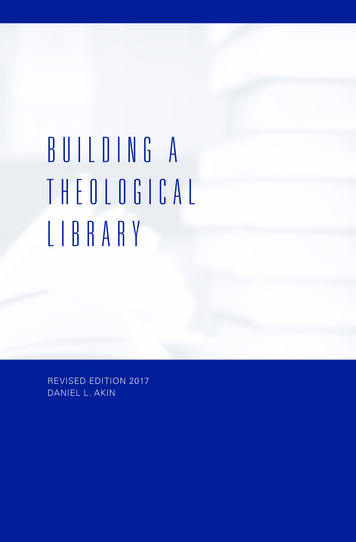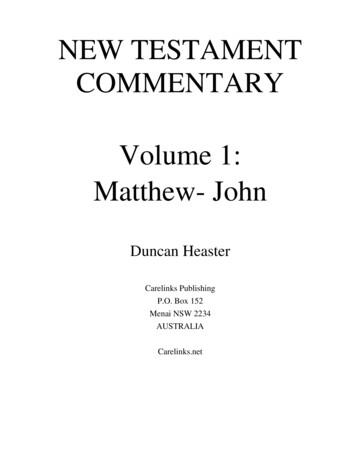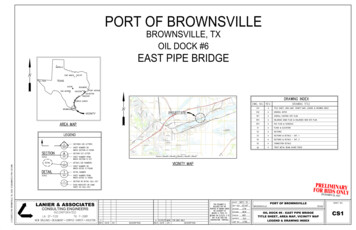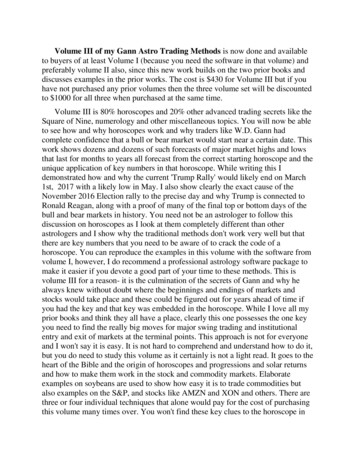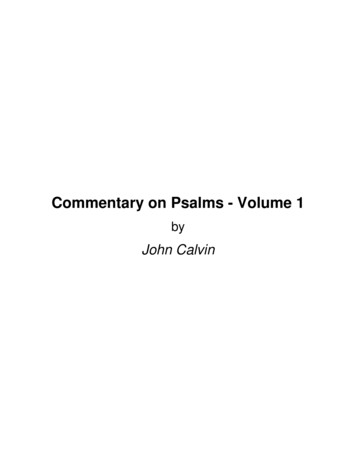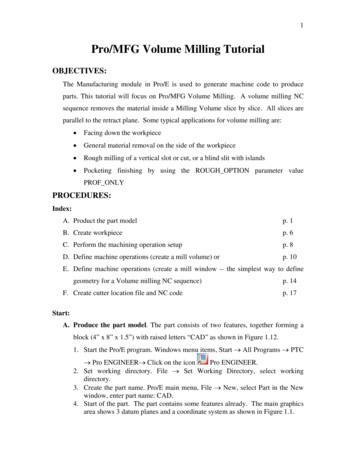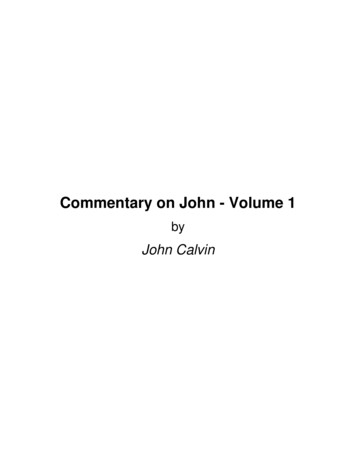
Transcription
Commentary on John - Volume 1byJohn Calvin
About Commentary on John - Volume 1 by John al Comments:Contributor(s):LC Call no:LC Subjects:Commentary on John - Volume in, John (1509-1564)(Alternative)(Translator)Grand Rapids, MI: Christian Classics Ethereal LibraryPublic Domain1.0 initial scanning created much American spelling. sg initial XMLinsertion, footnote reconciliation. 1.01 fj XML for OLB, French/Latininserted for Footnotes only.Ages (Transcriber)sg, fj (Markup)BS491The BibleWorks about the Bible
Commentary on John - Volume 1John CalvinTable of ContentsAbout This Book. . . . . . . . . .Commentary on John 1-11. . .Translator's Preface. . . . . . . .Featherstone's Dedication. . . .Featherstone's To the Reader.Calvin's Epistle Dedicatory. . .The Argument. . . . . . . . . . .Chapter 1. . . . . . . . . . . . . .John 1:1-5. . . . . . . . . . . . .John 1:6-13. . . . . . . . . . . .John 1:14. . . . . . . . . . . . .John 1:15-18. . . . . . . . . . .John 1:19-23. . . . . . . . . . .John 1:24-28. . . . . . . . . . .John 1:29-34. . . . . . . . . . .John 1:35-39. . . . . . . . . . .John 1:40-42. . . . . . . . . . .John 1:43-46. . . . . . . . . . .John 1:47-51. . . . . . . . . . .Chapter 2. . . . . . . . . . . . . .John 2:1-11. . . . . . . . . . . .John 2:12-17. . . . . . . . . . .John 2:18-22. . . . . . . . . . .John 2:23-25. . . . . . . . . . .Chapter 3. . . . . . . . . . . . . .John 3:1-6. . . . . . . . . . . . .John 3:7-12. . . . . . . . . . . .John 3:13-18. . . . . . . . . . .John 3:19-21. . . . . . . . . . .John 3:22-28. . . . . . . . . . .John 3:29-34. . . . . . . . . . .John 3:35-36. . . . . . . . . . .Chapter 4. . . . . . . . . . . . . .John 4:1-9. . . . . . . . . . . . .John 4:10-15. . . . . . . . . . .iii.p. iip. 1p. 2p. 4p. 6p. 7p. 10p. 12p. 12p. 17p. 23p. 25p. 29p. 32p. 34p. 38p. 39p. 41p. 42p. 46p. 46p. 51p. 54p. 56p. 59p. 59p. 65p. 68p. 73p. 74p. 76p. 80p. 82p. 82p. 84
Commentary on John - Volume 1John 4:16-21.John 4:22-26.John 4:27-34.John 4:35-38.John 4:39-45.John 4:46-54.Chapter 5. . . .John 5:1-9. . .John 5:10-15.John 5:17-19.John 5:20-24.John 5:25-29.John 5:30-32.John 5:33-36.John 5:37-40.John 5:41-47.Chapter 6. . . .John 6:1-13. .John 6:14-21.John 6:22-25.John 6:26-29.John 6:30-33.John 6:34-40.John 6:41-45.John 6:46-51.John 6:52-58.John 6:59-64.John 6:65-71.Chapter 7. . . .John 7:1-8. . .John 7:9-13. .John 7:14-19.John 7:20-24.John 7:25-30.John 7:31-36.John 7:37-39.John 7:40-44.John 7:45-53.Chapter 8. . . .John 8:1-11. .John Calvin.iv.p. 87p. 91p. 95p. 98p. 100p. 103p. 107p. 107p. 110p. 113p. 115p. 119p. 122p. 123p. 125p. 127p. 132p. 132p. 136p. 139p. 140p. 143p. 145p. 149p. 151p. 154p. 158p. 161p. 165p. 165p. 167p. 169p. 172p. 174p. 177p. 179p. 182p. 184p. 188p. 188
Commentary on John - Volume 1John 8:12-14. . . . . . . . . . . . .John 8:15-20. . . . . . . . . . . . .John 8:21-24. . . . . . . . . . . . .John 8:25-29. . . . . . . . . . . . .John 8:30-38. . . . . . . . . . . . .John 8:39-42. . . . . . . . . . . . .John 8:43-45. . . . . . . . . . . . .John 8:46-50. . . . . . . . . . . . .John 8:51-55. . . . . . . . . . . . .John 8:56-59. . . . . . . . . . . . .Chapter 9. . . . . . . . . . . . . . . .John 9:1-5. . . . . . . . . . . . . . .John 9:6-12. . . . . . . . . . . . . .John 9:13-17. . . . . . . . . . . . .John 9:18-23. . . . . . . . . . . . .John 9:24-33. . . . . . . . . . . . .John 9:34-41. . . . . . . . . . . . .Chapter 10. . . . . . . . . . . . . . . .John 10:1-6. . . . . . . . . . . . . .John 10:7-10. . . . . . . . . . . . .John 10:11-15. . . . . . . . . . . .John 10:16-18. . . . . . . . . . . .John 10:19-30. . . . . . . . . . . .John 10:31-36. . . . . . . . . . . .John 10:37-42. . . . . . . . . . . .Chapter 11. . . . . . . . . . . . . . . .John 11:1-10. . . . . . . . . . . . .John 11:11-17. . . . . . . . . . . .John 11:18-27. . . . . . . . . . . .John 11:28-38. . . . . . . . . . . .John 11:39-44. . . . . . . . . . . .John 11:45-52. . . . . . . . . . . .John 11:53-57. . . . . . . . . . . .Indexes. . . . . . . . . . . . . . . . . .Index of Scripture References. .Index of Scripture Commentary.Greek Words and Phrases. . . .Hebrew Words and Phrases. . .Latin Words and Phrases. . . . .French Words and Phrases. . . .John Calvin.v.p. 191p. 193p. 195p. 197p. 201p. 204p. 206p. 208p. 210p. 212p. 216p. 216p. 219p. 221p. 225p. 227p. 229p. 235p. 235p. 237p. 240p. 242p. 245p. 249p. 251p. 254p. 254p. 257p. 259p. 262p. 265p. 268p. 272p. 274p. 274p. 276p. 277p. 279p. 279p. 280
Commentary on John - Volume 1John Calvinvi
Comm on John (V1)John CalvinCOMMENTARYON THEGOSPEL ACCORDING TOJOHNBY JOHN CALVINA NEW TRANSLATION, FROM THE ORIGINAL LATIN,BY THE REV. WILLIAM PRINGLEVOLUME FIRSTCHRISTIAN CLASSICS ETHEREAL LIBRARYGRAND RAPIDS, MIhttp://www.ccel.org
Comm on John (V1)John CalvinTHE TRANSLATOR’S PREFACECommentaries on the Gospel according to John are numerous, and some of them are writtenwith great learning and ability. Rarely has a separate and extended interpretation been given to anyof the other three Gospels, which are, indeed, so closely interwoven with each other, that it isscarcely possible to expound one of them in a satisfactory manner, without bringing the whole intoone view, comparing parallel passages, accounting for apparent contradictions, and supplying theomissions of each narrative, to such an extent as to produce what shall be in substance, though notalways in form, a Harmony of the Three Evangelists.Few of these difficulties meet the expositor of John’s Gospel, in which the slender thread ofnarrative — until it reaches the period of the last sufferings of our Savior — does little more thanconnect long discourses, which He delivered to the multitude and to his disciples. Whatever opinionmay be formed as to the theory of the elder Tittmann, that John, wrote his work for the expresspurpose of proving the supreme Divinity of Christ, we cannot avoid being struck with the fact, thatthe miracles which he selects are distinguished by peculiar grandeur, and that the discourses whichhe relates contain the most abundant and delightful exhibitions of the glory of the Son of God, andof the nature of his mediatorial office, which our great Master was pleased to make during hispersonal ministry.Lampe, Hutcheson, and Tittmann, are better known, and more highly esteemed, in this countrythan any other Commentator on John that could be named. The three quarto volumes of Lampe area monument of judicious toil, and present such stores of philological, historical, and theologicallearning as ought never to be mentioned but with respect and gratitude. Though not free from thefaults of the Cocceian School, of which his miscellaneous treatises afford some unhappy proofs,his Commentary displays generally such caution and judgment, that it deserves to be not onlyconsulted, but perused throughout, and carefully studied. Hutcheson wanted both the acuteness andthe industry requisite for the successful elucidation of the Holy Scriptures, but is justly admiredfor the copiousness, variety, and excellence of his practical observations.Tittmann’s Meletemata Sacra in Evangelium Joannis, now happily rendered accessible to theEnglish reader, 1 I must be regarded as one of the most valuable contributions of modern times tobiblical interpretation. Accurate scholarship, elegant and flowing language, deep reverence for theinspired volume, and a warmth of affectionate piety closely resembling that of the disciple whomJesus loved, have gained for that work a reputation which is likely to increase. To the reader whois chiefly desirous to ascertain the meaning of Scripture, and who willingly dispenses with whatserves no other purpose than illustration: Tittmann’s exposition of the first four Chapters of John’sGospel will be highly acceptable; though it must be acknowledged that the remaining portion ofthe work — not executed till towards the close of the life of the venerable author — is somewhatless attractive, and, if it has been prepared with equal care, yet, in consequence of extremeunwillingness to bring forward explanations which had been already given, it will sometimesdisappoint one who only dips into an occasional passage, and has not made himself familiar withthe profound views unfolded in the earlier pages.1Clarke’s Biblical Cabinet, volumes 44 and 45.2
Comm on John (V1)John CalvinThese and other eminent writers have been deeply indebted to Calvin’s Commentary on John’sGospel, but have left its claims to the attention of all classes of readers as strong and urgent as ever.Where they differ from him, they often go astray, and where they agree with him, they generallyfall below the instructive power of his own pen; for few can equal his clear and vigorous statements.When he places in a just light — as he frequently does — those texts which had been wrested forthe confutation of heretics, none but eager and unscrupulous controversialists will complain. Everyhonorable mind will admire the unbending integrity of our Author, which, even in the defense oftruth, disdains to employ an unlawful weapon, and devoutly bows to the dictates of the Holy Spirit.The present Work brings under review some of the most intricate questions in theology; andin handling them he is not more careful to learn all that has been revealed than to avoid unauthorizedspeculation. They who know the difficulty of the path will the more highly appreciate so skillful aguide, who advances with a firm step, points out the bypaths which have misled the unwary, conductsus to scenes which we had not previously explored, and aids us in listening to a Divine voice whichsays, This is the way, walk, ye in it.In the Harmony of the Three Evangelists, the reader is so constantly referred to this Commentary,which appeared two years sooner, that the benefit of the former cannot be fully reaped, unless thelatter be at hand. The Author’s references are sometimes vague, but the Translator has endeavoredto discover and point out the page in which the desired information may be obtained.W.P.thAuchterarder, 10 April, 1847.3
Comm on John (V1)John CalvinTO THE RIGHT HONORABLETHE LORD ROBT. DVDLEY,EARLE OF LEYCESTER,baron of denbigh, maister of the horse to the queene’s maiestie,knight of the noble order of the garter, and one of thequeene’s maiestie, most honorable priuie counsel,chancelour of the most famous vniuersitieof oxford, christopher fetherstone,wisheth encrease of spirituallgiftes, long life, happydayes, and encreaseof honourIt is an old saying, (Right Honorable,) and no lesse true then olde, that saleable wines neede noiuie bush which prouerb importeth thus much, that thinges which are of themselues good &commendable haue not any, at leaste no greate need of commendation. If, therefore, I should withfine filed phrases, with gay geason woords, with straunge examples, and notable hystories, compoundsome long Prologue and tedious Preface in commendation of this most excellent work andCommentarie, of that famous member and faithfull Doctour of God’s Church, Maister Iohn Caluine,I might cause your Honour to suspect the fondnesse thereof: I my selfe should seeme to doubte ofthe goodnesse thereof: and, finally, minister occasion to many to condemne me of folly. Omitting,therefore, that which is needlesse, I descend vnto that which is needefull: to wit, to excuse my selfeof arrogancie wherof some may accuse me, in that I dare presume to dedicate vnto your Honourthis my translation, vnto whom I am altogether vnknowne. The loade stone, as men say, writers dotestifie and experience doth teach, hath in it selfe such power, force, and vertue, that it draweth ironvnto it though it be farre distant; right so, vertue doth drawe men vnto it, and the reporte thereofcauseth men to loue those whome they haue not seene, and to reuerence those of who they haueonely heard, which thing, sithence it is so, there is no cause why I shoulde either be accused ofarrogancie or condemned of impudencie for approching so boldly vnto your Honour, and forsuffering this my translation to appeare in your name. For your friendes confesse, and your foescannot Justly denie, that God hath placed in your noble breast great aboundance of most heroicallvertues, I omit to speake of that rare report of your vnfeigned religion which resoundeth euerywhere, and redoundeth to your prayse. I should be tedious if I should set downe particularly themost vndoubted testimonies of your faithfulness toward your dread Soueraigne: I should seeme toflatter if I would extoll that godly magnanimiti, wherwith the Lord hath endued you to maintainehis truth, to defend the realm, to subdue those proud aspiring Papists. That great and earnest carewhich your Honour hath alwaies had, and euen now hath, to support the poore ministers of theWord and Gospell of Iesus Christ in God’s cause, and in good causes, hath in it selfe sufficientforce to enforce not onely me, but all thankfull heartes, by word and writing, to bewray allthankfulnesse and dutifulnesse towards your good Honor, as this, so that singular liberalitie vsedat all times by your Lordship towards my friends, hath caused me, in dedicating of this booke toyour Honour, to testifie some parte of my thankfull minde in their behalfe. And heere I am to crauepardon of you, whiche I hope I shall easily obtaine, for that I haue not behaued my selfe finely as4
Comm on John (V1)John CalvinI might though faithfully as I ought in this my worke. And thus, fearing prolixitie, I conclude,praying; unto the Lorde God of heauen and earth, that King of Kinges and Lorde of Lordes, thathe will graunt vnto your Honour and to the rest (whom he hath placed in the like degree of dignitie)his Holy Spirite, that Spirite of wisdome and vnder-standing, that you may thereby be so directedthat all your thoughts, woordes, and workes, may tend to the setting foorth of God’s glory, themaintenance of true religion, the preseruation of the realme. So shall England haue wealth, be voideof woe, enjoy, solace, be free from sorrow, possesse plentie, nor tast of pouertie, inherite pleasure,and not see paine. Which God graunt.Your Honour’s most humble and obedient,Christopher Fetherstone5
Comm on John (V1)John CalvinTO THE READERBeing instantly requested (gentle reader) by my godly zealous friendes, to enterprise thetranslating of this most learned Commentarie of M. Iohn Caluine, and being perswaded thervntoby many godly reasons, whereof God’s glory and the profite of his Church should be the cheife, Icould not nor would not refuse to take that charge vp on me, vnlesse I should haue forgotten mydutie towardes God, his Church, and my friendes; and now, forasmuch (gentle reader) as the principalrecompence of my paines shal be that profit which thou shalt reape by the reading of this mytranslation, I beseech thee refuse not to take some paines in reading the same. I have not stuft itfull of strange words deriued of the Latine, which might no lesse molest thee then if they continuedLatine as they were. I haue not racked the phrases to make them runn smoothly to please daintieeares, and so digressed from the truth and meaning of the authour; but, so much as possible I could,I haue translated worde for worde, which the learned by conference shall wel perceiue. Long timehaue the godly desired to haue this worke published in the English tongue, and seeing they hauetheir desire now, my request vnto them is to accept of my paines herein. I dare not, good reader,presume so farre vpon mine owne skill as to saye that there is no faultes committed heerein, but Iam earnestly to desire thee rather courteously to amend them then curiously to condemne me forthem. And thus, trusting to thy curtiesie, I committe thee to the tuition og the Almightie, who sodirect thee by his Spirite, that by reading thou maiest profite.Thine in the Lorde,Christopher Fetherstone6
Comm on John (V1)John CalvinTHE AUTHOR’S EPISTLEDEDICATORYTo TheTRULY HONOURABLE AND ILLUSTRIOUS LORDS,THE SYNDICS AND COUNCIL OF GENEVA,JOHN CALVINSUPPLICATES FROM THE LORD THE SPIRIT OF WISDOM AND FIRMNESS, ANDA PROSPEROUS ADMINISTRATION.I never call to remembrance that saying of Christ, in which he sets so high a value on the dutyof receiving strangers with kindness as to reckon it done to himself, without considering, at thesame time, the extraordinary honor which he has been pleased to confer on you, by making yourcity the resort, not of one or a few individuals, but of his Church at large. Among heathen countrieshospitality was always commended, and was even accounted one of the principal virtues; and,accordingly, when they intended to denounce any people as barbarians and savages of the loweststamp, they called them, ἀξένους, or — which means the same thing — inhospitable. But far higherpraise is due to you that, in these troublesome and unhappy times, the Lord has appointed you tobe the persons whose support and protection should be solicited by godly and inoffensive menbanished and driven from their native countries by the wicked and cruel tyranny of Antichrist. Andnot only so, but he has also dedicated to his name a sacred dwelling-place among you, where hisworship may be maintained in purity.Whoever attempts, in the slightest degree, openly to invade, or secretly to take from you, thesetwo advantages, not only labors to deprive your city of its brightest ornaments, but beholds itsexistence and safety with an envious eye. For though the kind offices which are here performedtowards Christ and his scattered members excite the barking of wicked men against you, still youought to look upon yourselves as abundantly compensated by this single consideration, that angelsbless you from heaven, and the children of God bless you from every quarter of the world; so thatyou may boldly despise the foul slander of those men who are not restrained either by scruples ofconscience, or by shame, from pouring out more outrageous insults on God himself than on you,— nay, who, when they wish to calumniate you, begin with blaspheming God. Though this veryoccasion 2 kindles the rage of many people against you, yet you have no reason to dread any dangerarising from it, so long as their fury shall be counteracted by the protection of His hand who hathpromised that He will be the faithful Guardian of those cities in which the doctrine of His Gospelshall remain, and in which godly men, whom the world cannot endure, shall be permitted to dwell.I say nothing as to its being unnecessary to give yourselves any uneasiness about conciliating thisclass of enemies; for there is no man that is hostile to you for the sake of the Gospel, who wouldnot desire to see you ruined or oppressed on other grounds. But granting that there were no other2(“Ascavoir que l’Evangile, et ceux qui y veulent adherer, ont yei leur retraitte,”) — (namely, that the gospel, and those whowish to abide by it, have their retreat here)7
Comm on John (V1)John Calvinreason why you are hated by the avowed enemies of sound doctrine, than because they see youemployed in defending it, still, disregarding their stratagems and threatenings, you ought resolutelyto defend those two impregnable bulwarks, the purity of religious worship, and a godly anxiety tomaintain the Church which Christ has placed under the shelter of your wings.So far as relates to the slanders which are thrown at us by the Pope’s hired brawlers — that wehave apostatized from the Church, because we have withdrawn from subjection to the See of Rome— I wish it were as much in our power to protest with unshaken confidence before God and theangels, that we are at the greatest possible distance from that filthy puddle, as we can easily andreadily defend ourselves from the crime which they are in the habit of laying to our charge. Theyboast, indeed, of the name of the Catholic Church, though no part of the whole doctrine of the Lawand the Gospel has been permitted by them to remain free from shameful corruptions, though theyhave profaned the whole worship of God by the filth of their superstitions, and have not scrupledto debase all the ordinances of God by their inventions. Nay more, so Catholic — so universal —is the mass of errors by which they have overturned the whole of religion, that it would be enoughto destroy and swallow up the Church a hundred times over. We can never, therefore, extol, interms so lofty as the matter deserves, the unbounded goodness of God, by which we havemiraculously escaped from that destructive whirlpool, and have fixed the anchor of our faith onthe firm and everlasting truth of God. 3 And, indeed, this Commentary will itself, I trust, be asufficient proof that Popery is nothing else than a monster formed out of the innumerable deceptionsof Satan, and that what they call the Church is more confused than Babylon.Yet I will candidly acknowledge — what is actually true — that we are not at a sufficientdistance from that filthy pit, the contagion of which is too widely spread. Antichrist complains thatwe have fallen away from him; but we 4 are compelled to groan that too many of the pollutionswith which he has infected the whole world remain amongst us. God has graciously restored to us5uncontaminated purity of doctrine, religion in its primitive state, the unadulterated worship ofGod, and a faithful administration of the Sacraments, as they were delivered to us by Christ. Butthe principal cause which hinders us from attaining that reformation of conduct and of life whichought to exist is, that very many persons, remembering that unbridled licentiousness in which thePapists indulge in opposition to the command of God, cannot become accustomed to the yoke ofChrist. Accordingly, when our enemies, in order to excite against us unfounded dislike among theignorant, raise a vexatious outcry that we have broken all discipline, their calumny is abundantlyrefuted (even though we should remain silent) by this single consideration, that at home we haveno contest more severe than about — what is considered, at least, by many people to be — ourexcessive severity. But since you are the most competent witnesses for myself and my colleagues,that we are not more rigid and severe than the claim of duty demands and even compels us to be,as we freely submit to the decision of your conscience respecting us; so, on the other hand, youwill easily perceive at a glance the singularly ridiculous impudence of our enemies on this subject.I shall now say a few words about myself as an individual. Though I trust that my numerouswritings will be a sufficient attestation to the world in what manner I have taught this Church, yet345The French version adds “a ce qu’elle ne flottast plus parmi les traditions des hommes;” — “that it might no longer betossed about among; the traditions of men.”“Nous qui taschons de remettre l’estat de l’Eglise a son entier;” — “we who endeavor to restore the Church to her originalcondition.”“Dieu par sa grace nous a restitue.”8
Comm on John (V1)John CalvinI have thought that it would be of very great importance for me to draw up a special record on thissubject inscribed with your name; for it is highly necessary that the kind of doctrine which youacknowledge to be taught by me should be exhibited to the view of all. 6 Now though, in all thebooks which I have hitherto published, it has been my endeavor that you and the people under yourcharge should derive advantage from them even after my death, and though it would be highlyunbecoming that the doctrine which has emanated from your city to foreign nations should yieldfruit extensively, but be neglected in the place of its abode, yet I trust that this Commentary, whichis especially dedicated to you, will take a firmer hold of your memory. For this purpose I pray toGod to inscribe it so deeply with His own finger on your hearts that it may never be obliterated byany stratagem of Satan; for to Him does it belong to crown my labor with success, who has hithertogiven me such courage as to desire nothing more than to watch faithfully over the safety of youall. Farther, as I freely acknowledge before the world that I am very far from possessing the carefuldiligence and the other virtues which the greatness and excellence of the office requires in a goodPastor, and as I continually bewail before God the numerous sins which obstruct my progress DoI venture to declare that I am not without an honest and sincere desire to perform my duty. And if,in the meantime, wicked men do not cease to annoy me, as it is my duty — by well-doing — torefute their slanders, so it will belong to you to restrain those slanders by the exercise of that sacredauthority with which you are invested. Wherefore, my Illustrious and highly honored Lords, Irecommend you to the protection of our good God, entreating Him to give you always the spirit ofprudence and virtue for governing aright, and to make your administration prosperous, so that Hisname may be thereby glorified, and that the result may be happy for you and yours. 7Geneva,1st January, 1553.67The French copy adds: “afin qu’on n’en juge point a l’aventure, ni a, credit;” — “that they may not judge of it at random,or on trust.”In the concluding sentence, the more amplified form of the French version has been followed. — Ed.)9
Comm on John (V1)John CalvinTHE ARGUMENTOF THEGOSPEL OF JOHNThe meaning of the Greek word, εὐαγγέλιον (Gospel) is well known. 8 In Scripture it denotes,by way of eminence, (κατ ἐξοχὴν,) the glad and delightful message of the grace exhibited to usin Christ, in order to instruct us, by despising the world and its fading riches and pleasures, to desirewith our whole heart, and to embrace when offered to us, this invaluable blessing. The conductwhich we perceive in irreligious men, who take an extravagant delight in the empty enjoyments ofthe world, while they are little if at all, affected by a relish for spiritual blessings, is natural to usall. For the purpose of correcting this fault, God expressly bestows the name Gospel on the messagewhich he orders to be proclaimed concerning Christ; for thus he reminds us that nowhere else cantrue and solid happiness be obtained, and that in him we have all that is necessary for the perfectionof a happy life.Some consider the word Gospel as extending to all the gracious promises of God which arefound sca
Comm on John (V1) John Calvin These and other eminent writers have been deeply indebted to Calvin’s Commentary on John’s Gospel, but have left its claims to the attentio

